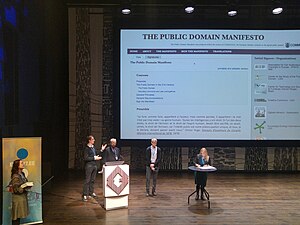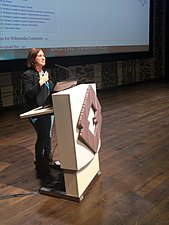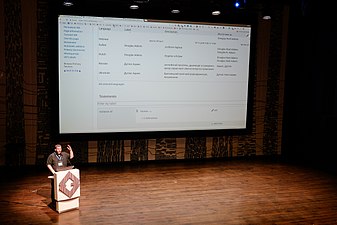GLAM/Newsletter/November 2017/Contents/Estonia report
|
Digital Humanities Conference held as Part of Estonian Presidency of Council of the EU
(Originally published in CEE Newsletter November 2017 issue)
Digital Humanities conference titled "Open Licenses / Content / Data : Tools for Developing Digital Humanities" took place from the 1st to 3rd of November in Estonian National Museum in Tartu as part of the official events program of Estonian Presidency of Council of the European Union.
The main goal of the conference was to inspire and educate about the benefits of opening up the content in public collections and to build bridges between the more academic digital humanities community and the staff of memory institutions (archives, museums, libraries, galleries). As m:Wikimedia Eesti was one of the main organizers of the event, a special focus was on the GLAMwiki collaboration whereby more and more content finds its way to different wiki-projects (mainly Wikimedia Commons, Wikidata, Wikipedia). The 2-day conference main program was followed by the graduate school workshops, which were open for conference participants as well.
The conference in general had a good discussing and working atmosphere with an emphasis on creating a shift towards open in digital humanities. For example already during opening of the conference, participants were given a chance to sign The Public Domain Manifesto. As mentioned before, Wikimedia had a central role in the conference, with 2 keynote speakers being Wikidata missionary Asaf Bartov and long time GLAMwiki practicioner Liam Wyatt, well known in Wikimedia CEE collab. In addition to many Estonian Wikimedians participating on the conference, they were accompanied by colleagues from Finland, Latvia and Poland.
-
Opening, signing of The Public Domain Manifesto
-
Liam Wyatt having fun conducting a GLAM-Wiki workshop
-
Klara Sielicka-Baryłka speaking about work with Wikimedia Polska
-
Asaf Bartov smiling while giving a gentle introduction to Wikidata for humanists
GLAMwiki
One of the central Wikimedia topic on the conference was explaining essence of Wikimedia (through Wikipedia) to digital humanities people, followed by a workshop-discussion around GLAMwiki opportunities, i.e. what collaborating with Wikimedians and contributing to Wikimedia projects could add to quotidian work of digital humanities. The keynote for this track, delivered by Liam Wyatt, was named "Wikipedia: the Endless Palimpsest" and revisited speaker's thesis, providing good insight into how Wikipedia works, as well as to aspects that are similar in the workings of Wikipedia and in the practice of academics and researchers. The talk was well received and gave a good ground for workshop discussion.
A more practical overview of GLAM cooperation with Wikimedia was given by Klara Sielicka-Baryłka from Museum of Ethnography in Warsaw, Poland, who spoke about collaboration of her museum with m:Wikimedia Polska. Namely, international Carpathian Ethnography Project was presented with examples of usefulness of such collaboration for GLAM institution. Generally, it can be said that an effort was made to spark interest in such collaboratives on a wider scale, which will hopefully result in some collaborative project ideas in the future.
You can read about conference participant experience of Klara Sielicka-Baryłka in Poland report of our newsletter
Wikidata
The tone of the conference was set by Asaf Bartov giving his keynote about Wikidata, named "Wikidata for Humanists: A Gentle Introduction to Wikimedia's Linked Data Project". Although some of the example queries were not too well supported by internet connectivity issues on the venue, the project itself impressed a number of participants. This presentation was supported by a workshop held on the third day of the conference, which provided a possibility for a more articulated overview of first steps in and possibilities of Wikidata. The workshop also provided a good chance to brush their Wikidata skills for more experienced Wikimedians - as Liam Wyatt later stated: "Having followed the workshops at the third day, I FINALLY am getting comfortable with Wikidata Queries and SPARQL."
Organizational details
The conference was organized in collaboration of m:Wikimedia Eesti, Estonian Society for Digital Humanities, Estonian Literary Museum, Estonian Photographic Heritage Society, Archaeovision, Estonian Graduate School of Linguistics, Philosophy and Semiotics (GSLPS), ASTRA project of the Estonian Literary Museum (EKMDHUM), Centre of Excellence for Estonian Studies (CEES).
The event was supported by the Government Office of Estonia in collaboration with the National Foundation of Civil Society, European Union under the European Regional Development Fund (ASTRA project of Estonian Literary Museum EKMDHUM, the Centre of Excellence in Estonian Studies).
- Australia and New Zealand report
- Brazil report
- Côte d'Ivoire report
- Czech Republic report
- Estonia report
- France report
- Germany report
- Ireland report
- Macedonia report
- Netherlands report
- Serbia report
- Spain report
- Sweden report
- Tunisia report
- UK report
- Ukraine report
- USA report
- Special story
- Wikidata report
- WMF GLAM report
- Calendar






